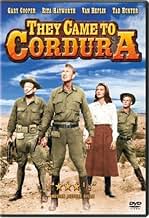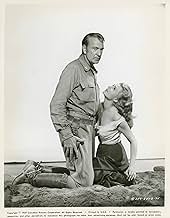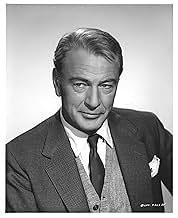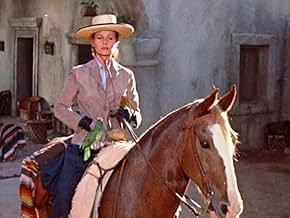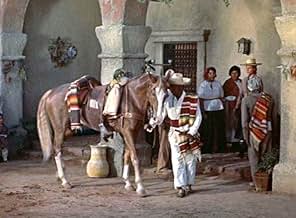IMDb RATING
6.4/10
2.6K
YOUR RATING
An army major, himself guilty of cowardice, is asked to recommend soldiers for the Congressional Medal of Honor during the Mexican Border Incursion of 1916.An army major, himself guilty of cowardice, is asked to recommend soldiers for the Congressional Medal of Honor during the Mexican Border Incursion of 1916.An army major, himself guilty of cowardice, is asked to recommend soldiers for the Congressional Medal of Honor during the Mexican Border Incursion of 1916.
- Director
- Writers
- Stars
- Awards
- 1 win & 1 nomination total
Jim Bannon
- Capt. Paltz
- (as James Bannon)
Wendell Hoyt
- Cavalry Trooper
- (uncredited)
- Director
- Writers
- All cast & crew
- Production, box office & more at IMDbPro
6.42.6K
1
2
3
4
5
6
7
8
9
10
Featured reviews
Imperfect, overlong and superficially wordy but still an interesting story
Angered by the US President Wilson's increasing support the rising Mexican political leader General Carranaza, the former US darling Francisco Villa sends his group of rebels to raid a town in New Mexico before coming back over the border. Enraged by the audacity of the man, Wilson orders his troops across the border to catch and/or kill Villa. Part of the group he sends is Major Thomas Thorn, who has been given the job of assessing the men for possible awards a comfortable job given to him by Colonel Rogers, a friend of his father. Fascinated by the nature of heroes, Thorn finds himself given command of a small group of them when he refuses to put Rogers forward for a citation. Thorn is keen to get to know more of the men but, with a captured woman in tow, the men are not as simple as their proposed medals would suggest.
Despite pretty much ignoring the interesting history that serves as a backdrop to this film, this is actually still quite an interesting film that was a lot rawer than I expected it to be, given the period in which it was made. In the early stages it was too basic and I worried that the whole thing would be as clunky as Thorn's early questioning of some of his "heroes", but gradually it got better as it went on and simple lines such as hero and coward were eroded away. This is not to say it is brilliant because it most certainly is not but it is certainly interesting for what it tries to do. It doesn't help that the script really labours the surface but lacks the ability to go significantly deep to really make an impact. However even with this, it was still interesting enough to hold me and I did enjoy the solid if simplistic moral debate that it delivered.
Rossen and his cinematography do great work with the wide-open landscapes but the former must also carry the can for not bringing more emotion out of the script consistently. As a result the cast do well without really excelling with nobody guiding them deeper, this is really what I could have expected. Cooper is as solid as usual with what I suppose was a brave role for him to take. He deals with it well but perhaps wasn't good enough to really convince in layers although he is superficially good enough. Hayworth doesn't have that great a character and her delivery occasionally gets a bit too over-the-top when asked to deliver more emotionally charged material, she has impact but I was looking for more pain and fear. The support cast work well with what they have been given to do. Conte, Heflin, Keith and Hunter are among those giving solid turns in support of Cooper and the raw story.
Overall then this is not a great film but it is an interesting one. Despite being over 45 years old it is surprising raw and willing to turn away from the simple lines of courageous and cowardly towards something that is much realer and well conceived. It doesn't go deep enough but it is strong on the surface could easily have been tighter and dropped 20-30 minutes from the running time but is still worth a look for what it does do well.
Despite pretty much ignoring the interesting history that serves as a backdrop to this film, this is actually still quite an interesting film that was a lot rawer than I expected it to be, given the period in which it was made. In the early stages it was too basic and I worried that the whole thing would be as clunky as Thorn's early questioning of some of his "heroes", but gradually it got better as it went on and simple lines such as hero and coward were eroded away. This is not to say it is brilliant because it most certainly is not but it is certainly interesting for what it tries to do. It doesn't help that the script really labours the surface but lacks the ability to go significantly deep to really make an impact. However even with this, it was still interesting enough to hold me and I did enjoy the solid if simplistic moral debate that it delivered.
Rossen and his cinematography do great work with the wide-open landscapes but the former must also carry the can for not bringing more emotion out of the script consistently. As a result the cast do well without really excelling with nobody guiding them deeper, this is really what I could have expected. Cooper is as solid as usual with what I suppose was a brave role for him to take. He deals with it well but perhaps wasn't good enough to really convince in layers although he is superficially good enough. Hayworth doesn't have that great a character and her delivery occasionally gets a bit too over-the-top when asked to deliver more emotionally charged material, she has impact but I was looking for more pain and fear. The support cast work well with what they have been given to do. Conte, Heflin, Keith and Hunter are among those giving solid turns in support of Cooper and the raw story.
Overall then this is not a great film but it is an interesting one. Despite being over 45 years old it is surprising raw and willing to turn away from the simple lines of courageous and cowardly towards something that is much realer and well conceived. It doesn't go deep enough but it is strong on the surface could easily have been tighter and dropped 20-30 minutes from the running time but is still worth a look for what it does do well.
They Came to the Point
Glendon Swarthout's brutal, excellent novel receives a handsome, intelligent, and staid Hollywood adaptation---toned down and with a happier ending and less savage sense of irony. Robert Rossen isn't able to keep the film moving. His direction is heavy and without pace, almost formal---a mistake in a story where desperate people are pushed so hard they crack up. The screenplay is relatively faithful to the book but smooths off the rough edges, as expected in an early 60s Hollywood feature. What results is a digest of the book, with themes turned into talking points conveyed through on-the-nose dialogue, especially in the new material at the end.
As usual in his later roles Gary Cooper conveys pained dignity, but he's too old and difficult to accept as a coward. A 40-something Jimmy Stewart, with his reserves of neurosis, or Henry Fonda, whose rectitude could shade into unbending mania, would have been better choices. Rita Hayworth is perfect as the middle-aged woman of ill-repute, while Van Heflin is impressively scummy but not physically imposing enough as Sgt. Chawk. Tab Hunter convinces as a careerist Lieutenant but can't convey seediness. The other soldiers are one note and less vivid than in the book, which is more worth your time.
As usual in his later roles Gary Cooper conveys pained dignity, but he's too old and difficult to accept as a coward. A 40-something Jimmy Stewart, with his reserves of neurosis, or Henry Fonda, whose rectitude could shade into unbending mania, would have been better choices. Rita Hayworth is perfect as the middle-aged woman of ill-repute, while Van Heflin is impressively scummy but not physically imposing enough as Sgt. Chawk. Tab Hunter convinces as a careerist Lieutenant but can't convey seediness. The other soldiers are one note and less vivid than in the book, which is more worth your time.
One act of bravery doesn't make a man brave for all his life.
On the night of March 18th, 1916, a large mounted force of Mexican rebels under Pancho Villa crossed the American border and attacked the town of Columbus, killing both civilians and soldiers. As a result of this action, the United States Army sent an expedition into Mexico with orders to capture Villa and disperse his forces. It was during this campaign that one man, a United States Army officer, was forced to come face to face with two of the great fundamental questions that affect mankind.
What is courage? What is cowardice? This is the story of his search for an answer.
That summary is the opening text from this oddly {to me} divisive picture from Robert Rossen and Ivan Moffat. Divisive because there are conflicts about it's technical aspects, its length {which cut is original?}, it's talky nature, and if it's splendid cast did the material justice? Well the dispute about the technical aspects being poor certainly don't stand up to the version I saw of the picture, lovely widescreen CinemaScope with Burnett Guffey's photography astutely and rightly oppressive as the story unfolds. As for its length, the version I viewed was two hours long, is this a restored cut or is there still another half hour of Rossen footage lurking somewhere? Either way, the complaint about there being gaps in the film are not evident in this two hour cut. All characters are fully fleshed and every minute of this picture was engrossing and perpetually watchable. The cast are also on fine form, Gary Cooper is perfectly cast as Maj. Thomas Thorn, the man who's moment of weakness hangs heavy round his neck like a curse. Van Heflin, Rita Hayworth, Dick York, Richard Conte and Tab Hunter all help to make this a fine character driven piece.
Above all else it's the story that works the best, Thorn is carrying around a burden as he strives to take these heroes to safety and ensure they receive their medals of honour. But the perilous journey proves to alter each man's attributes, be it despicable or otherwise, something that to me personally makes this a thematically excellent picture, the kind we could do with more of in the modern era. It may well be cynical at times, but really that is no bad thing in my eyes, it's a cop out of sorts I know, but this film isn't for everyone. After a fine battle sequence has been and gone, the film shifts in tone and becomes a picture about the complexities of man and his own personal hang ups, the result of which left me very much rewarded. 8/10
What is courage? What is cowardice? This is the story of his search for an answer.
That summary is the opening text from this oddly {to me} divisive picture from Robert Rossen and Ivan Moffat. Divisive because there are conflicts about it's technical aspects, its length {which cut is original?}, it's talky nature, and if it's splendid cast did the material justice? Well the dispute about the technical aspects being poor certainly don't stand up to the version I saw of the picture, lovely widescreen CinemaScope with Burnett Guffey's photography astutely and rightly oppressive as the story unfolds. As for its length, the version I viewed was two hours long, is this a restored cut or is there still another half hour of Rossen footage lurking somewhere? Either way, the complaint about there being gaps in the film are not evident in this two hour cut. All characters are fully fleshed and every minute of this picture was engrossing and perpetually watchable. The cast are also on fine form, Gary Cooper is perfectly cast as Maj. Thomas Thorn, the man who's moment of weakness hangs heavy round his neck like a curse. Van Heflin, Rita Hayworth, Dick York, Richard Conte and Tab Hunter all help to make this a fine character driven piece.
Above all else it's the story that works the best, Thorn is carrying around a burden as he strives to take these heroes to safety and ensure they receive their medals of honour. But the perilous journey proves to alter each man's attributes, be it despicable or otherwise, something that to me personally makes this a thematically excellent picture, the kind we could do with more of in the modern era. It may well be cynical at times, but really that is no bad thing in my eyes, it's a cop out of sorts I know, but this film isn't for everyone. After a fine battle sequence has been and gone, the film shifts in tone and becomes a picture about the complexities of man and his own personal hang ups, the result of which left me very much rewarded. 8/10
They Came to Cordura
Take Gary Cooper and Rita Hayworth, surround them with a core of actors who are still well-known today, add beautiful scenery, tackle a very interesting philosophical question. What's not to like? As it turns out, there's a lot not to like. Coop's role is to portray a world-weary, duty-bound officer, obsessed with heroism. Diappointingly, "wooden" would best describe his take on the role. Hayworth, as tequila-drinking, cigarette-smoking, comforter-of-America's-enemies is, at times, over the top. She's still got the sexy sizzle she's known for, but the sexual tension between her and the men isn't compelling. The supporting members of the cast are supposed to devolve from heroes to louts, but their hand is tipped so early in the movie, that their later actions are expected--not deplored. It's a dark western that would appear to be yin to "The Magnificent Seven"'s yang. Heroes become brutes--brutes become heroes. The later is a lot more entertaining and--a lot more satisfying.
One act of cowardice doesn't make a man a coward forever, just as one act of bravery doesn't make a man a hero forever.
The Pancho Villa Expedition—officially known in the United States as the Mexican Expedition and sometimes colloquially referred to as the Punitive Expedition—was a military operation conducted by the United States Army against the paramilitary forces of Mexican revolutionary Francisco "Pancho" Villa from 1916 to 1917 during the Mexican Revolution. The expedition was launched in retaliation for Villa's attack on the town of Columbus, New Mexico, and was the most remembered event of the Border War. The expeditions had one objective: to capture Villa dead or alive and put a stop to any future forays by his paramilitary forces on American soil.
After contact with the enemy, and after losing many men, five men were nominated for the Medal of Honor. Since the army needed living heroes to prepare the nation for its likely entry into WWI, Major Thomas Thorn (Gary Cooper), an awards officer, escorts the nominees, Lt. William Fowler (Tab Hunter), Sgt. John Chawk (Van Heflin), Cpl. Milo Trubee (Richard Conte), Pvt. Andrew Hetherington (Michael Callan), and Pvt. Renziehausen (Dick York), back to headquarters. This film is the story of that journey, and Thorn's exploration of the character of heroes.
Adelaide Geary (Rita Hayworth), an American woman who owns the ranch where the battle was fought, is sent back with them on charge of treason for aiding Villistas against American soldiers, even though she had no choice.
Although Hayworth and Cooper both gave impressive performances, Van Heflin was the standout as a brutish sergeant, especially since he was acting against type, having played decent men forced into heroism during his best-known films, Shane (1953) and 3:10 to Yuma (1957).
After contact with the enemy, and after losing many men, five men were nominated for the Medal of Honor. Since the army needed living heroes to prepare the nation for its likely entry into WWI, Major Thomas Thorn (Gary Cooper), an awards officer, escorts the nominees, Lt. William Fowler (Tab Hunter), Sgt. John Chawk (Van Heflin), Cpl. Milo Trubee (Richard Conte), Pvt. Andrew Hetherington (Michael Callan), and Pvt. Renziehausen (Dick York), back to headquarters. This film is the story of that journey, and Thorn's exploration of the character of heroes.
Adelaide Geary (Rita Hayworth), an American woman who owns the ranch where the battle was fought, is sent back with them on charge of treason for aiding Villistas against American soldiers, even though she had no choice.
Although Hayworth and Cooper both gave impressive performances, Van Heflin was the standout as a brutish sergeant, especially since he was acting against type, having played decent men forced into heroism during his best-known films, Shane (1953) and 3:10 to Yuma (1957).
Did you know
- TriviaAlthough Gary Cooper was 57, his character Major Thorn was forty years old according to the novel. Early in the film it is mentioned that Thorn's father had recently been killed while still on active service.
- GoofsMajor Thorn improperly salutes Colonel DeRose in the opening scene when he is dismissed. He should have saluted and held his salute until it was acknowledged. Instead, he lowers his arm even before Colonel Rose acknowledges it.
- Quotes
Major Thomas Thorn: Did you ever see the Medal of Honor?
Private Renziehausen: No, Sir.
Major Thomas Thorn: It's the most beautiful decoration of all, as it should be. I'd trade an ear for one any time, two in fact.
Private Renziehausen: Excuse me, Sir, but I'd rather have the ear.
- Crazy creditsOpening credits prologue:
On the night of March 8th, 1916, a large mounted force of Mexican rebels under Pancho Villa crossed the American Border and attacked the town of Columbus, New Mexico, killing and wounding both American civilians and soldiers.
As a result of this action,the United States Army sent an expedition into Mexico with orders to capture Villa and disperse his forces.
It was during this campaign that one man, an United States Army officer,was forced to come face to face with two of the great fundamental questions that affect mankind:
What Is Courage? What Is Cowardice?
This is the story of his search for an answer.
- ConnectionsFeatured in Stars of the Silver Screen: Rita Hayworth (2011)
- How long is They Came to Cordura?Powered by Alexa
Details
Box office
- Budget
- $4,000,000 (estimated)
- Runtime
- 2h 3m(123 min)
- Color
- Aspect ratio
- 2.35 : 1
Contribute to this page
Suggest an edit or add missing content



